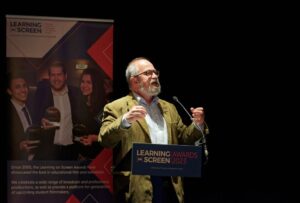Catching up with Robin Ince at the Learning on Screen Awards 2023
It would be fair to say that Robin Ince often goes a bit under the radar when we speak of Britain’s most influential comics. However, it only takes a quick Wiki search to reveal that he deserves to be right up there in the echelons. In a career spanning back to the early nineties, Robin Ince has written and performed in some of Britain’s best-loved television comedy shows, including Alastair McGowan’s Big Impression, The 11 O’Clock Show and Mock The Week. He has won numerous awards as a stand up comic, as well as authoring a handful of successful books.

Photo credit: Charles Henderson – https://www.charleshenderson.co.uk/
A supporter of the Rationalist Association, Ince is a champion of scientific ideas and enjoys creating content that appeals to curious minds. Alongside the Cosmic Shambles Network (cofounded in 2017) and various other exploits, Ince co-presents the popular BBC Radio 4 science series The Infinite Monkey Cage, alongside physicist Brian Cox. Now in it’s 27th series, the programme has received many plaudits and is a popular resource amongst ERA users.
We caught up with Robin at the Learning on Screen Awards to hear his thoughts on the role that broadcast content has to inspire learning:
In your book, The Importance of Being Interested: Adventures in Scientific Curiosity, the blurb states that you ‘quickly abandoned science at school, bored by a fog of dull lessons and intimidated by the barrage of equations’. Can you explain more about what you found off-putting about science in school and what might have helped you become more interested at an earlier age?
I think it was that science became about information but not stories and that information seemed detached from the world – there were equations, but what did those equations mean to me and what I saw and experienced?
To know that the chalk under my feet in the hills I grew up around was the result of sea life and to know that everything is in motion- the atoms within me and the galaxy that is continuing to travel as the earth can seem so still, creates the awe that we need to engage.
What changed your mind about science and what inspired you to create the Infinite Monkey Cage podcast with Brian Cox?
In some ways, I didn’t need my mind changed about science, it was more about school science. In my early 20s, I started reading popular science books and that was when I started working in stand up that included some of those ideas and when I started thinking about working out how to make shows that would appeal to people who didn’t realise that they too might love to engage with scientific curiosity.
To me, it is very important that Monkey Cage appeals to as many people as possible – I was at the Royal Institution and I was approached by two ten year olds who love listening to Monkey Cage – they were clearly brim-full of questions and excitement. I have also met a 94 year old who is a keen fan – I want everyone to know that the world is more wonderful the more curiosity you have.
What role can comedy play in learning? Is there room for a light-hearted approach to learning in schools?
I think it is about excitement as much as comedy – when I talk at primary schools or the Royal Albert Hall, I am always filled with delight on stage – no fakery necessary – but what comedy does is say “there is fun here, this is not a dry subject – ENGAGE”.
Did TV and radio play a role in your own education? What programmes stood out and why?
Carl Sagan’s Cosmos was very important to me, as were Schools and Colleges series like The English Programme . When I was a teen, I saw The Boys from The Blackstuff, and I think that played a major part in beginning to engage with ideas of fairness and how my privileged life was different to many other peoples. I was also fortunate to be brought up at a time when there were good documentaries on every night.
You are well known for bringing a sense of humour to science. What are the best broadcast examples where comedy and factual have worked well together?
Horrible Histories is a truly brilliant TV series and I have seen how much that has influenced kids and the adults who happily watched with them. Also, The Magic Roundabout introduced me to Sergei Eisenstein.
Podcasts have surged in popularity in recent years, with people of all ages consuming podcasts for both entertainment and educational purposes. Why do you think podcasts are a great learning resource?
I think podcasts often don’t have the restrictions and harsh editing of mainstream media, they can allow a conversation to run and trust the audience.
Which BBC comedies would you recommend for learning?
I think series like Getting On – set in a geriatric ward – combine humour and empathy and a little more understanding of people so often marginalised and Inside No. 9 is very good for telling you how not to kill people.
